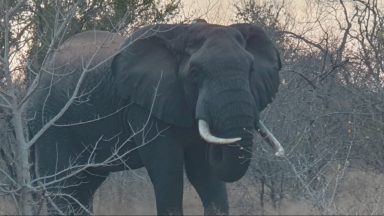Biodiversity matters. The lives of the Big 5 are intertwined with the lives of other, smaller species and also the health of the land. This slow and steady leopard tortoise plays its part by dispersing undigested seeds on its wanderings. Feeding on mixed grasses, thistles and succulents, it can spread these food sources for other herbivores to find, and over its 100-year lifespan, that’s a lot of sowing!
Snakes are carnivores, some hunting geckos and frogs, others feasting on small reptiles such as lizards. As predators, they help to maintain balance in the ecosystem. They are both predator and prey, often getting caught by birds, mammals and even other snakes, which are in turn eaten by bigger predators.
Pangolins, which are heavily trafficked and under threat of extinction, act as great gardeners, tending the soil and providing the earth with all-natural pest control through their natural movements alone. Good soil means plenty of vegetation for large herbivores like elephant and buffalo.
Many smaller wildlife species often live alongside larger creatures. Ultimately, species are often brought together by shared needs and circumstances. This species of guinea fowl lives in grassland or savanna, feeding on a variety of seeds and small invertebrates like spiders and beetles. They follow the giraffe and other large animals in order to hunt the insects that are flushed out by their movement. Some species eat incredibly high numbers of ticks and help prevent the spread of threats such as lyme disease.
It is often said that species diversity is the best measure of the health of an ecosystem. These guinea fowl and giraffe together is a great sign for Limpopo National Park which lies within the Mozambique component of the Great Limpopo Transfrontier Conservation Area. Helping biodiversity flourish is at the heart of the Peace Parks’ strategy for rejuvenating and rewilding southern Africa’s transfrontier conservation areas. There, the gecko, guinea fowl or snake are no less important than any of the big iconic animals, or the ticks for that matter!

